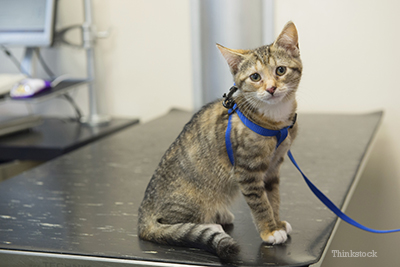Dr. Phil Zeltzman is a traveling, board-certified surgeon in Allentown, PA. His website is www.DrPhilZeltzman.com. He is the co-author of “Walk a Hound, Lose a Pound” (www.WalkaHound.com).
AJ Debiasse, a technician in Stroudsburg, PA, contributed to this article.
Cats are very independent and at times they may seem indestructible. But the truth is, they are just as fragile as any other pet. Many conditions require a surgeon to fix things up. Here is a list to help your cat avoid visiting your local surgeon. 1. Keep your cat indoors
1. Keep your cat indoors
Some cat guardians are offended when I suggest that they keep a cat indoors (usually after I repair a broken bone). “But he enjoys the great outdoors! It would be cruel to lock him up!” they say. I understand the concern, but sadly we live in a world that is not designed to keep our cats safe. Keeping your cat indoors can prevent many injuries that would require surgical repair. These include getting hit by a car, breaking bones or getting into a fight with a variety of animals (wild or domestic).
2. Spay or neuter
Spaying females prior to their first heat cycle can almost eliminate the risk of breast cancer and does eliminate the risk of infection of the uterus called pyometra. Neutering males reduces the level of male hormones, making your male cat less likely to run away, mark his territory and get into fights.
3. Kitty proof
Kitty proofing is easier said than done – yet critical. Any cat lover knows that cats can get in, on and around just about anything. But you can lessen the risk of trouble by keeping potential problems away. Lock up all strings, ribbons and sewing supplies to avoid the risk of swallowing deadly “linear foreign bodies.” Clean up small toys, especially if you have young children! Block off windows, balconies and lofts to lessen the risk of falling. Sadly, cats don’t always land on their feet.
4. Proper nutrition
Proper nutrition can prevent bladder stones or urinary blockage, which can be life-threatening in male cats. Many popular diets do not have the appropriate research behind them and can actually cause bladder stones, among other problems. The marketing is brilliant, the TV commercials are convincing, but the science is often lacking. The best way to be sure your cat is on the right diet is to ask your veterinarian.
5. Weight control
Overweight and obese cats can have countless health problems. The extra weight can cause wear and tear on the joints, especially the knees. It has also been linked to urinary blockage, which may require surgery.
6. Mass removal
When skin masses are allowed to grow, they may become larger than your general practitioner feels comfortable removing. Large masses on the legs may even require amputation. Removing a mass as early as possible may prevent the need for a surgeon.
7. Avoid fights
Cats are more fragile than they look. They can get into a fight with a housemate — canine or feline — causing extensive damage. Bites, although they may seem minimal on the outside, can go very deep and cause serious internal damage. Solutions include feeding your pets in different locations or at different times. Again, please keep your kitty indoors.
Thankfully, most cats are content indoors.
You may want to discuss these suggestions with your family veterinarian, and ask:
- What can I do to keep my cat safe?
- When should I spay or neuter my cat?
- When can we remove this skin mass?
- What do you think of my cat’s weight?
- Which food should I feed my cat?
If you have any questions or concerns, you should always visit or call your veterinarian -- they are your best resource to ensure the health and well-being of your pets.
